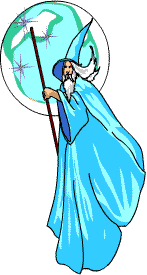Wizards
Created | Updated Oct 22, 2002
Many are from fiction, some from old legends which may fall half way between fact and fiction, and some have and do exist.
| A number of times within the BBC message boards and elsewhere the question of what a wizard is has come up. This page is an attempt to define this in a way that is as complete as possible but still recognising that labels of any type can mean totally different things to different people. Witches and wizards. You get male and female of both witches and wizards. In some forms of witchcraft, wizards are not recognised at all while in some others, usually the traditional as opposed to the newer forms, a wizard is the equivalent to a professor, with a specific area of craft skill. This gives a witch in effect two ways to progress, through to high priest(ess), more involved in ceremonial magic, or become a wizard and concentrate on craft skills such as trances/hypnosis type of magic or herbal cures or some other. They would however be a witch. |  |
Some individuals may choose to style themselves as wizards as opposed to witches, when they want to be more involved in extending the science areas of the craft, and not involved in the religion, or belief aspect normally considered a part of witchcraft. A herbalist, or someone involved in massage or aromatherapy are examples. Some sole witches, who are also Christians may also style themselves as wizards, to avoid the bias from some ill informed people. Many old country crafts, and skills that have been handed down could be considered to have been practiced by wizards.
Historic wizards.
Depending on your age and background, when you first hear the term wizard, you may think of Harry Potter, Merlin, Taliesin the bard, Circe the sorceress of Greek legend, or John Dee the court sorcerer of Elizabeth the first. While a great deal is known about John Dee, as there tends to be about several alchemists and inventors, there is less factual information on many others. Some of the people we now accept as setting the basics in science would have been thought of as wizards or the equivalent in their day.
From a historic perspective to become involved in any area of activity that involved seeing, magic or science was a risky process if it was either not supported by a person who could defend you, or you were involved within the Christian church. The Christian church for the majority of its existence was involved in magic, spells, talisman, and many other areas that today we think of as a part of witchcraft.
Merlin was not a single person but a series of people who held the title, however like other old legends, that have been passed down by mouth and embellished, before being written about far later, we have some difficulty in determining the fact from the exaggerations.
Druids of old were a class of society, rather than a specific job, so while some Druids of old may be thought of as wizards, like witches, not all could be.
From legends we learn wizards generally wore long baggy cloths, and a pointed hat, used a wand, and had a cauldron. Crystal balls, lamps, bells, seals and complete laboratories also feature.
Wizards today
Most modern day wizards are scientists, who dabble in the areas that have not yet become fully understood, experimenting, observing and testing philosophies in areas few understand or have considered, but as time goes by areas that were part of magic can not be explained, and old knowledge is being re-discovered, partly by conventional medicine and science and partly by people from witchcraft or wizard backgrounds.
The activities they are involved in may include magic, but often today is more specialist, to one or several craft skills, that tend to have modern names but used to be a part of witchcraft.
Recognising a wizard.
Some may say it is someone obsessional about research or some particular area of knowledge, Others say you can recognise a wizard as they are addicted to collecting books, some say it is the person watching and learning, or the person who thinks before they open their mouth. You cannot recognise they by their everyday dress, and few wear new age jewellery or symbols. They will tend towards being highly knowledgeable, very bright, content, seeing possibilities where others do not, in being tolerant, understanding, and seeing the positive in all cases, looking to correct problems and not serve out blame. They are open minded, looking to explore new areas and consider all possibilities. Job wise they will tend to be teachers, researchers, authors, company directors, rarely politicians or ministers, never police officers, or connected with the law.
Can you become a wizard?
The answer to this is that you may call yourself anything you like, but to be accepted by traditional witches and wizards you will have to have at least one major ability and have the right frame of mind.
Where can you find out more
Traditional Craft Association H2g2 Page or website
Water Witches H2g2 Page or website
Other H2G2 entries that you may find helpfull are:-
Aqua - the role or Aqua - helping people
Water witches
Witchcraft Index All the witchcraft links to h2g2 pages
If you have additional knowledge on wizards today please let me know using the button below.
